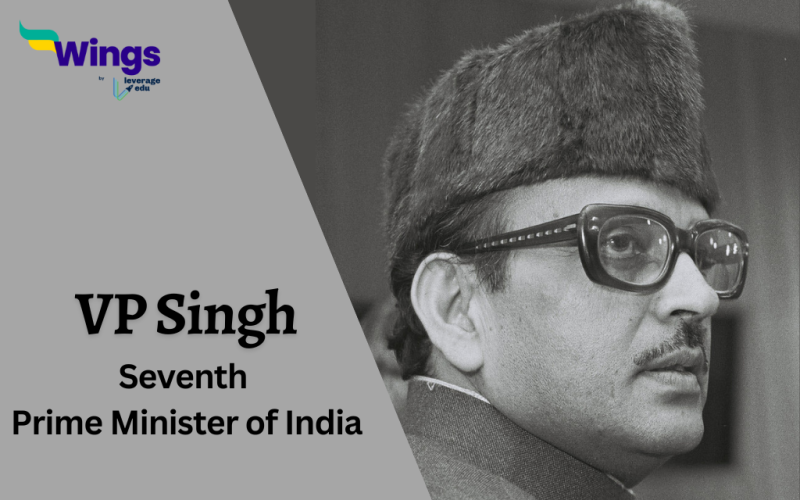Vishwanath Pratap Singh, popularly known as VP Singh was the 7th Prime Minister of India from 1989 to 1990. PM VP Singh was an Indian Politician who was known for his leadership, integrity, vision and his pursuit of social justice. He was the only PM to come from a background of Royalty after Independence. In this blog, we will learn more about PM VP Singh and his life along with his role in Indian Politics.
Who was PM VP Singh?
He was born on June 25, 1931, in the princely state of Manda now in Uttar Pradesh. Let’s delve into the life of PM VP Singh –
- VP Singh hailed from a politically influential family. He was an adopted son of Raja Bahadur Ram Gopal Singh, a freedom fighter who served as the Prime Minister of the erstwhile Princely State of Manda and was known for his progressive policies.
- Singh received his education at Dehradun and later pursued higher studies at Poona and Allahabad University.
- Influenced by the nationalist movement and inspired by leaders like Mahatma Gandhi, Singh actively participated in various student movements during his university days.
- He was married on 25th June 1955 to Smt. Sita Kumari and with her had two sons.
Also Read – Indira Gandhi: Know All About the First Woman Prime Minister of India
PM VP Singh’s Political Career
In 1969, Singh contested the Lok Sabha elections from the Fatehpur constituency and emerged victorious. This marked the beginning of his political career.
- He became a member of the Indian National Congress and held various ministerial positions in the government.
- His tenure as the Minister of Commerce and Industry in the year 1976-77 was particularly noteworthy, as he implemented several progressive policies to boost India’s economy.
- He was the 12th Chief Minister of Uttar Pradesh from 9th June 1980 to 19 July 1982.
- Thereafter, he went on to become Minister of Finance in the year 1984 to 1987.
- However, Singh’s ideological differences with the Congress leadership eventually led to his resignation from the party in 1987.
In the years 1988-1999, he joined as a member of Janta Dal and served as the 1st President of the party in 1988. He was elected as the Seventh Prime Minister of India from 2nd December 1989 to 10th November 1990. He also had the portfolio of Minister of Defence and Minister of External Affairs.
Also Read – Social Reformist Jyotiba Phule: Biography, History, Facts
Role in Indian Politics
- As Finance Minister and the Budget of 1985 –
- In 1985, VP Singh was appointed as the Finance Minister of India under Prime Minister Rajiv Gandhi’s government. He presented a revolutionary budget that aimed to bridge the gap between the rich and the poor.
- The budget introduced various measures like tax reforms, the abolition of wealth tax, and an increase in agricultural credit to uplift rural India. These initiatives won him praise and established him as a leader with a vision for inclusive growth.
- Bofors Scandal –
- The Bofors scandal was an alleged arms deal corruption case that shook Indian politics in the late 1980s. VP Singh, as the Defense Minister, initiated an investigation into the scandal, displaying his commitment to fighting corruption.
- Despite facing opposition from within his own party, VP Singh took a stand against corruption and eventually resigned from the government leading to a political uproar.
- Social Justice and Implementation of Mandal Commission Recommendations-
- As the seventh PM, VP Singh made social justice his primary agenda. He implemented the recommendations of the Mandal Commission, which aimed to provide opportunities and reservations to the historically disadvantaged Other Backward Classes (OBCs).
- While this decision was met with both appreciation and opposition, VP Singh’s commitment to uplifting the marginalized sections of society remained unchanged.
- Efforts for Communal Harmony and Ayodhya Controversy
- VP Singh actively worked towards maintaining communal harmony in a diverse country like India. During the Babri Masjid-Ram Janmabhoomi controversy, he took measures to prevent communal violence and followed the path of Secularism.
He was succeeded by Chandra Shekhar as the eighth PM of India. PM VP Singh is remembered as a leader who fearlessly challenged the status quo and fought for the rights of the underprivileged. He took his last breath on 27th November 2008.
Relevant Blogs
| Lord Lansdowne | Lord Irwin |
| Lord Lytton | Lord Chelmsford |
| The Government of India Act 1919 | Kiran Bedi |
| Morley-Minto Reforms | Gandhi Irwin Pact (1931) |
| Bengal Partition | Birsa Munda |
We hope you liked our blog. If you want to read more articles like this you can visit our general knowledge page on Indian History!
 One app for all your study abroad needs
One app for all your study abroad needs













